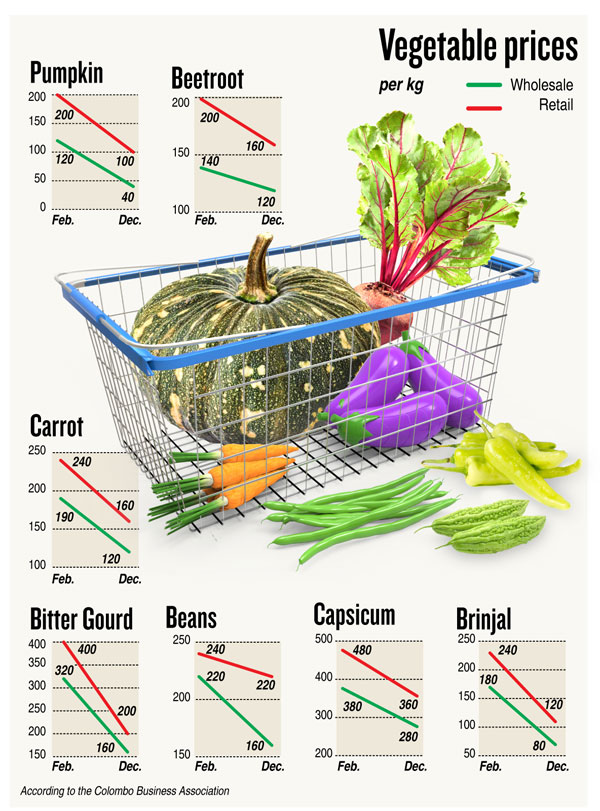News
Bad weather pushes vege prices up; expert calls for strategic direction in agri business
Farmers have cited adverse weather conditions as the reason for the sudden surge in vegetable prices this month.
“This is a seasonal increase in prices that usually happens after the November monsoon,” said Ajantha Abeyratne who has been farming in Mattala for the past fifteen years. “The crops get destroyed, leading to a supply drop, which together with a rise in demand causes the price hike.”
The farmer pointed out that the prices had gone up after they had remained low for a long period during the lockdown.
Colombo Business Association General Secretary Chaminda Vidanagamage said the COVID-19 lockdown affected the agri business significantly as sellers could not go into lockdown areas. This resulted in farmers’ produce not being sold, he said.
 “To cultivate their crops, most farmers obtain loans in the hope they can pay back once they sell their harvest. When they cannot sell their crop, they have no time or money to cultivate another crop. If the vegetables that come to Dambulla, the main wholesale vegetable market of the country, do not get sold the farmers do not earn anything,” Mr. Vidanagamage explained.
“To cultivate their crops, most farmers obtain loans in the hope they can pay back once they sell their harvest. When they cannot sell their crop, they have no time or money to cultivate another crop. If the vegetables that come to Dambulla, the main wholesale vegetable market of the country, do not get sold the farmers do not earn anything,” Mr. Vidanagamage explained.
He noted that before the COVID-19 pandemic’s second wave, most vegetables fetched prices between Rs.100 and 160 a kilogram in the wholesale market.
“The main issue, however, is that, despite being an ancient agricultural nation, we are not market-oriented farmers,” he noted. “Farmers farm with no strategic understanding about the market and consumer behaviour. There is no system. The crops from Kandy come to Dambulla first and are then distributed to Kandy again through the vendors who come there. This itself adds a huge transportation cost to the price,” the expert pointed out.
He said that about ten to twenty tons of vegetables got thrown away every day when vendors could not come to the Dambulla wholesale market due to the lockdown in their areas.
“We need a system that coordinates and connects the farmers to the vendors better. This can be done with provincial economic centres being the distribution point of vegetables,” Mr. Vidanagamage said. If such a system is in operation, farmers can transport the required vegetables in the right amounts to the vendors straightaway. We need to bring technology to our agricultural sector too. These are some of the simple solutions to the problems,” he said.
Mr. Vidanagamage held that governments had over the years failed to provide long term solutions to these issues. He noted that the Agriculture Ministry was often guilty of making statistic based decisions that were impractical as they failed to factor primary elements like the weather when decisions were made.
The expert noted that members of his association believed that uplifting the agricultural sector should be an integral part of the economic revival strategy.
“From reducing the exorbitant amounts of waste in Dambulla to educating farmers on the requirements of the market and giving farmers a reasonable price for their crops will add more strategic direction to the agricultural sector,” he said.
Mr. Vidanagamage urged the authorities to take the association’s views into consideration when decisions were made as they had information on prices, production costs and marketing strategies.

